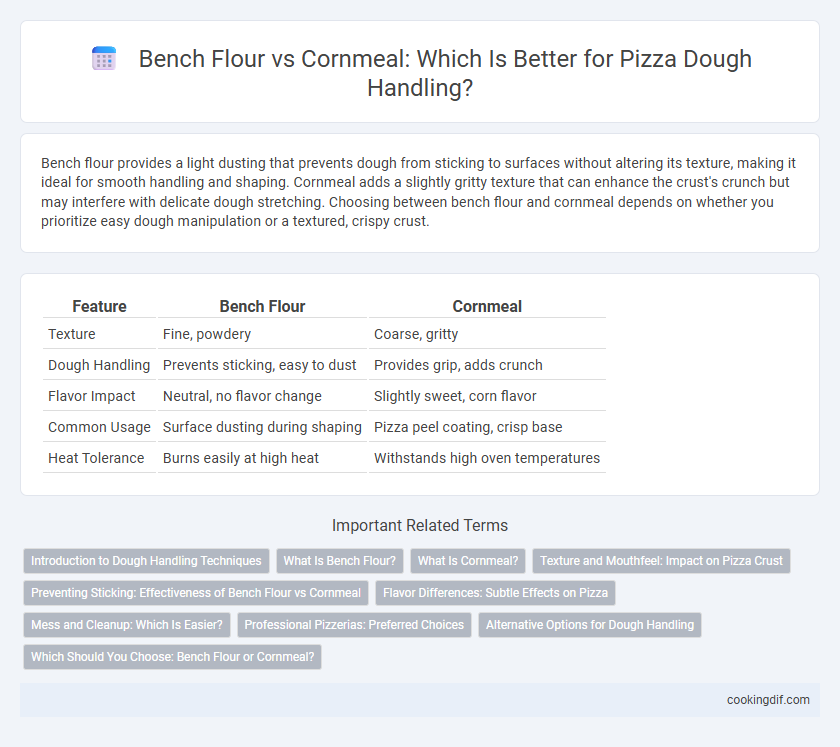Bench flour provides a light dusting that prevents dough from sticking to surfaces without altering its texture, making it ideal for smooth handling and shaping. Cornmeal adds a slightly gritty texture that can enhance the crust's crunch but may interfere with delicate dough stretching. Choosing between bench flour and cornmeal depends on whether you prioritize easy dough manipulation or a textured, crispy crust.
Table of Comparison
| Feature | Bench Flour | Cornmeal |
|---|---|---|
| Texture | Fine, powdery | Coarse, gritty |
| Dough Handling | Prevents sticking, easy to dust | Provides grip, adds crunch |
| Flavor Impact | Neutral, no flavor change | Slightly sweet, corn flavor |
| Common Usage | Surface dusting during shaping | Pizza peel coating, crisp base |
| Heat Tolerance | Burns easily at high heat | Withstands high oven temperatures |
Introduction to Dough Handling Techniques
Bench flour prevents pizza dough from sticking to surfaces during shaping, providing a smooth, easy-to-handle texture that reduces tearing and sticking. Cornmeal adds a gritty texture and acts as tiny ball bearings, allowing dough to slide effortlessly on peel or baking surfaces but may affect crust texture if overused. Selecting between bench flour and cornmeal depends on desired dough elasticity and final crust characteristics in pizza preparation.
What Is Bench Flour?
Bench flour is a high-gluten flour used to dust the work surface when handling pizza dough, preventing sticking without transferring excess moisture. Unlike cornmeal, which adds a gritty texture and crunch to the crust, bench flour allows for smooth shaping and stretching by creating a soft barrier. Pizza chefs prefer bench flour for its ability to maintain dough elasticity and produce a tender crust.
What Is Cornmeal?
Cornmeal is coarsely ground maize used in pizza making to prevent dough from sticking to surfaces and to create a crispy crust texture. Unlike bench flour, which is finely milled wheat flour primarily used for dusting work surfaces, cornmeal adds a slight crunch and distinct flavor profile to pizza bases. This gritty texture and natural oil content in cornmeal make it an ideal choice for handling dough without absorbing moisture like flour.
Texture and Mouthfeel: Impact on Pizza Crust
Bench flour creates a slightly chewy and tender pizza crust due to its moderate protein content, enhancing dough elasticity and rise. Cornmeal adds a distinctive gritty texture and a subtle crunch to the crust's bottom, preventing sticking without altering dough moisture. Choosing between bench flour and cornmeal directly affects the final pizza's texture, balancing softness and a crisp, satisfying mouthfeel.
Preventing Sticking: Effectiveness of Bench Flour vs Cornmeal
Bench flour and cornmeal both prevent dough from sticking during pizza preparation, but their effectiveness varies based on texture and hydration. Bench flour creates a smooth, non-sticky surface that is easier to clean and provides a fine barrier for dough, while cornmeal adds a gritty texture that prevents sticking but can impart a slightly crunchy bottom. Choosing between bench flour and cornmeal depends on the desired dough handling experience and final crust texture, with bench flour favored for ease and cornmeal for added crispness.
Flavor Differences: Subtle Effects on Pizza
Bench flour contributes a mild, slightly sweet flavor to pizza dough, enhancing the overall taste without overpowering the toppings. Cornmeal adds a distinct, slightly nutty and grainy flavor that can create a more rustic and textured crust experience. Using cornmeal for dough handling may impart subtle flavor nuances that complement artisanal pizza styles, while bench flour maintains a more neutral dough base.
Mess and Cleanup: Which Is Easier?
Bench flour creates a fine dusting on surfaces, which can lead to flour clouds and sticky residue, but it is easier to sweep or vacuum after use. Cornmeal provides a coarse texture that reduces dough sticking and adds a crunchy texture to the crust, though its granules can scatter and require more effort to fully clean from cracks or porous countertops. For mess and cleanup, bench flour generally offers quicker cleanup, while cornmeal may demand more detailed sweeping or wiping.
Professional Pizzerias: Preferred Choices
Professional pizzerias often prefer bench flour over cornmeal for dough handling due to its superior texture and elasticity, which facilitates easier stretching and shaping. Bench flour minimizes sticking without altering the dough's flavor, providing a consistent and smooth surface essential for high-volume pizza production. Cornmeal is occasionally used to add a slight crunch and prevent sticking, but it can interfere with dough handling precision and is less favored in professional settings.
Alternative Options for Dough Handling
Bench flour provides a non-sticky surface for pizza dough, preventing it from adhering during shaping and stretching. Cornmeal acts as an excellent alternative by creating a coarse barrier that allows the dough to slide easily onto the pizza stone without absorbing moisture. Both options improve dough handling efficiency, but cornmeal adds a slight crunch and flavor contrast to the crust edge.
Which Should You Choose: Bench Flour or Cornmeal?
Bench flour creates a smooth, non-sticky surface ideal for rolling and shaping pizza dough, preventing it from absorbing moisture and becoming gummy. Cornmeal adds a crunchy texture and helps prevent dough from sticking to the peel or countertop, but it can be grittier and alters the crust's mouthfeel. Choose bench flour for a cleaner, softer dough handling experience, while cornmeal suits those who prefer a crispier, textured crust foundation.
Bench flour vs cornmeal for dough handling Infographic

 cookingdif.com
cookingdif.com